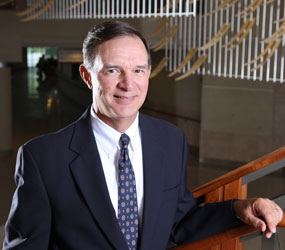TOWSON – Late last year, St. Joseph Medical Center agreed to pay the U.S. government $22 million to settle allegations it was involved in a kickback scheme with MidAtlantic Cardiovascular Associates (MACVA). Dr. Mark Midei, a one-time MACVA partner who later worked for St. Joseph, was accused of performing medically unnecessary stent procedures.
In the wake of the federal settlement, Jeff Norman, St. Joseph’s new president/CEO, has overseen an extensive overhaul of some of the hospital’s policies.
Norman recently spoke with The Catholic Review about the changes and what comes next for the historic Catholic hospital.
CR: When you came here more than a year ago, is it fair to say there was a crisis of confidence at St. Joseph Medical Center?
Norman: We did market research before the Department of Justice investigation began – one (focus group and survey) before the stenting issue became public and three since then. There was a slight drop in confidence in St. Joseph Medical Center early on. In the last two surveys, there’s been a leveling of that. The drop in confidence was fairly minor when you look at the overall survey. People looked at it and thought it’s a physician in a particular area – it’s not an institution-wide issue.
CR: Do you believe there are good safeguards in place now that there wouldn’t be a repeat of what happened?
Norman: I do. With Linda Pilla as our vice president and corporate responsibility officer, she is very expert in making sure that everything we do – whether it’s contracts or policies or procedures – that they meet all the federal and state guidelines, laws and regulations. We’re a very regulated sector of the economy, and she’s at our table for all our major policy and procedural kinds of issues.
We’ve all gone through a lot of training and education – 10 hours of training for all of the senior management and middle management.
We’ve set up a whole new department of peer review that’s focused only on peer review.
CR: How has peer review changed?
Norman: In the past, there was a lot of statistical review. Where we’ve gotten to now in health care is, we’ll continue to do statistical review, but we’re also going to do a very robust individual review. That’s what we’ve added to our whole peer review program, because statistical review doesn’t identify whether a procedure was necessary or not.
CR: Had you relied mostly on statistical review previously?
Norman: Not entirely, but mostly. There are indicators for a particular procedure. If the outcome fell outside that, then there would tend to be a focused review. We always did that. What we’re doing now, it doesn’t matter if it falls outside or not, we’re going to do a randomized review applied against these indicators anyway and so that’s the enhancement – making sure we’re doing specific, individualized reviews on a random basis – all the time, of all physicians.
CR: Have people embraced the changes?
Norman: I think so. When we did our training, 100 percent of the employees and 100 percent of medical staff did it. Three-quarters of the medical staff is not employed by us. For them, it was purely a voluntary effort to do the training and every person did it – that was amazing, that all of the physicians understood and embraced the importance of the effort.
CR: Are there any lessons to be learned from what St. Joe has gone through?
Norman: I think being ever vigilant in everything you do to make sure that all of the many rules and regulations and laws that govern health care are being met and observed. I think another big lesson is to make sure there’s always double oversight.
CR: What are some of the future plans for St. Joseph?
Norman: We’re looking very aggressively at diversification – geographically, where we will be moving our primary care physicians out further into the community where people live and work. It’s already happening.
We’re down the street with Towson medical associates, we also have a practice in Owings Mills and we just committed to developing a new practice in the Box Hill Corporate Center. We have located a site in Hunt Valley area to be developed. We’re also looking at the development of a primary care group in Essex and Westminster.
As we look at the traditional hospital services on campus, what can we do to expand those programs and services to meet the needs of the community? We are going to rebrand our heart program as the Heart and Vascular Institute. We have the best orthopedic group in the marketplace. There are 18 physicians in that group. We want to do all we can to work with them. People are growing older and staying alive longer. Those kinds of services will continue to be in high demand.
We’re the only community hospital in Maryland and one of 30 nationwide that has a designation by the National Cancer Institute as a community cancer center program. We all know someone touched by cancer. We want to make sure we are expanding those services.
We deliver about 2,200 babies a year. We would like to expand those services and see that go up by about 500.
We continue to see the population become more consumer sensitive as they purchase health care services. We are trying to inform people about what you can expect when you come to St. Joe. We developed an app (smart phone application) so people can find out how long they can expect to wait at our emergency room.
We have a special desire to serve the community that’s underserved. We want to expand our uninsured and the underinsured in Baltimore County because there’s a lot more people who live in the county who don’t have access to services than you might think.


